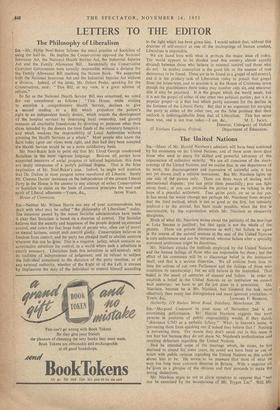SH1,—Neither Mr. Wilson Harris nor any of your correspondents has
dealt with what may be called "the philosophy of Liberalism" today. The measures passed by the recent Socialist administration have made it clear that Socialism is based on a doctrine of control. The Socialist believes that the security and happiness of the people depend on/external control, and caters for that large body of people who, often out of moral or mental laziness, accept such control gladly. Conservatism believes in freedom from control, and the party has pledged itself to abolish controls
• 'wherever this can be cjone. This is a negative policy, which contains no crnstructive substitute for control, in a world where such a substitute is • clearly necessary. Liberalism finds this substitute in self-control t with its tradition of independence of judgement, and its refusal to subject the individual conscience to the dictation of the party machine, or of any external authority, whether of the Right or of the Left, it stresses by implication the duty of the individual to control himself according to the light which has been given him. l would submit that, without this doctrine of self-control as one of the mainsprings of human conduct, Liberalism is impossible.
We are faced here with what is perhaps the major issue of today. The world appears to be divided (and this country almost equally divided) between those who believe in external control and those who do not. In neither conception is the good life or the essence of true democracy to be found. These are to be found in a gospel of self-control, and it is the primary task of Liberalism today to preach that gospel from the house-tops, and to practise it in the House of Commons (even though the practitioners there today may number only six, and wherever else it may be practised. It is the gospel which the world needs, but it is not the gospel of either of our other two political parties ; nor is it a popular gospel—it is that fact which partly accounts for the decline in the fortunes of the Liberal Party. But that is no argument for merging the party in either of the other two, on the false pretence that their outlook is indistinguishable from that of Liberalism. This has never been true, and is not true. today.-1 am, &c., M. L. JACKS,
Director, Univqrsity of Oxford
15 Norhant Gardens, Oxford. Department of Education.














































































 Previous page
Previous page